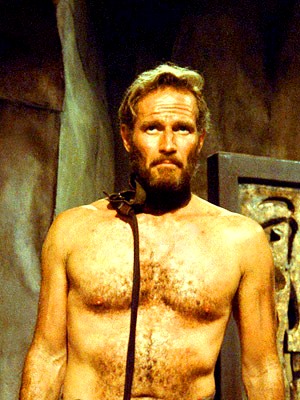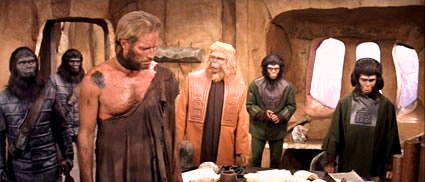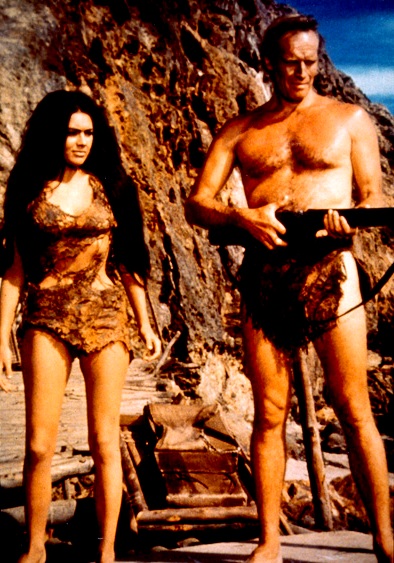
Planet of the Apes (1968), set upon a journey through the galaxy, had a fantastic space and sleep hibernation opening, followed by a crash landing onto an unknown planet with three surviving astronauts led by Charlton Heston that has visual wallop. They lose much of their supplies in the drowning of their spacecraft and head onto an unknown trek first for water. There are signs of other life on the planet but are uncertain as to where any habitable region could be. Regardless, the astronauts are stuck with no way home. The breathlessness of the film can be credited to Franklin J. Schaffner who directed the Oscar-winning “Patton” two years later.

A dominant society has cultivated topsoil to create a province similar to those of the ancient Greek in our history. The central talking apes – conveniently speaking English (not French, but thankfully not Russian or Slavic) – were led by human sympathizers Cornelius and Dr. Zira (Roddy McDowall and Kim Hunter), with the doubting Minister  of Science Dr. Zaius (Maurice Evans) as an opponent to the captured Taylor (Heston), his vocal chords shot to @#!*% . Humans are the stupid and primitive ones, but Heston does get a sensuous companion with Nova (Linda Harrison, left) who is a dream girl mute.
of Science Dr. Zaius (Maurice Evans) as an opponent to the captured Taylor (Heston), his vocal chords shot to @#!*% . Humans are the stupid and primitive ones, but Heston does get a sensuous companion with Nova (Linda Harrison, left) who is a dream girl mute.
“Take your stinking paws off me, you @#!*% dirty ape,” the one human plea that is an anti-establishment threat. Dr. Zaius and the other governing body of apes immediately want to shut up a talking human because it’s a threat to the pyramid of life. If humans are treated with dignity then they would no longer be able to dissect them. You can’t suppress Homosapien rights forever, so leave it to Heston to emancipate from the zoo menagerie and set on a hopeful embark on his own quest for human civility if there is any beyond the outreaches of the Forbidden Zone.
A box office hit in its release ($32 million on a $6 million budget), it not only was a stand-out science fiction film then but stands up as brawny entertainment today. The French novel it was based upon by Pierre Boulle in 1963 was adapted to the screen by Rod Serling of “The Twilight Zone,” one of the great classic television series. Serling’s trademark method was to hook his audience with sociological issues, build his plots around paradoxes, and then hit us with a final discovery that had your mind winding back to its beginning to reconsider the whole story in a brand new light. He was the right man for the job.
 “Apes” was so thrilling and ripe for possibilities that it seemed absolutely right to spawn more sequels to give us more adventures and revelations. The possibilities seemed endless, but the four sequels that followed managed to slip up again and again handicapped mostly by poor filmmaking. If you look at the years of succession you can see the quick follow-up was rushed on each installment to cash in on a fevered fast buck.
“Apes” was so thrilling and ripe for possibilities that it seemed absolutely right to spawn more sequels to give us more adventures and revelations. The possibilities seemed endless, but the four sequels that followed managed to slip up again and again handicapped mostly by poor filmmaking. If you look at the years of succession you can see the quick follow-up was rushed on each installment to cash in on a fevered fast buck.
“Beneath the Planet of the Apes” (1970), the second in the series, ventured to explore underground societies that might occupy human resistance but basically stunk up a promising plot. “Escape from the Planet of the Apes” (1971), the third in the series, was closest to delivering a story with depth. “Conquest for the Planet of the Apes” (1972), the fourth in the series, was the worst of them with measly story development. “Battle for the Planet of the Apes” (1973), the final chapter, had series burnout and a predictable and soggy finish. “Planet of the Apes” (2001) was the first reboot done by Tim Burton, but was a pointless and terribly made exercise that clumped along and was photographed with dreary murkiness – so bad it stands in abandonment.
The current “Rise of the Planet of the Apes,” with its San Francisco Golden Gate bridge climax, is the reboot done right managing to construct interesting sci-fi origins in such a way that has us psyched for upcoming sequels. Four sequels would be too much, but a trilogy would be my idea to cap the saga justly.




